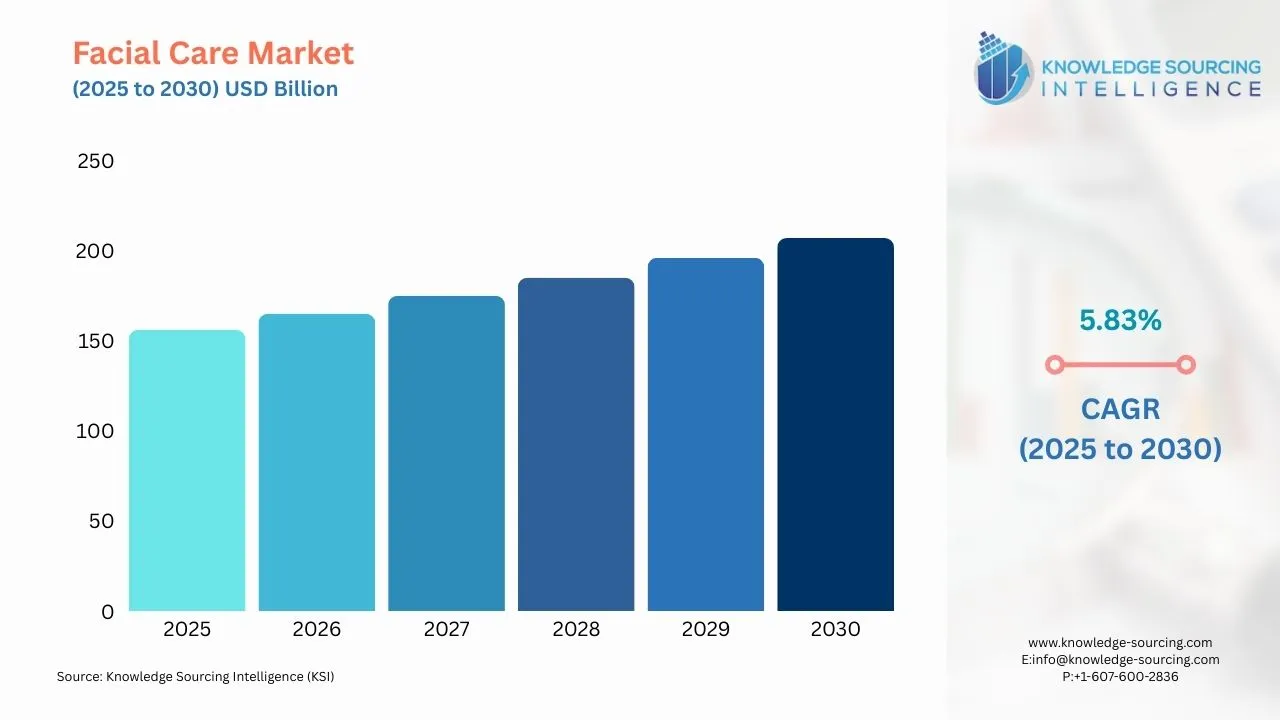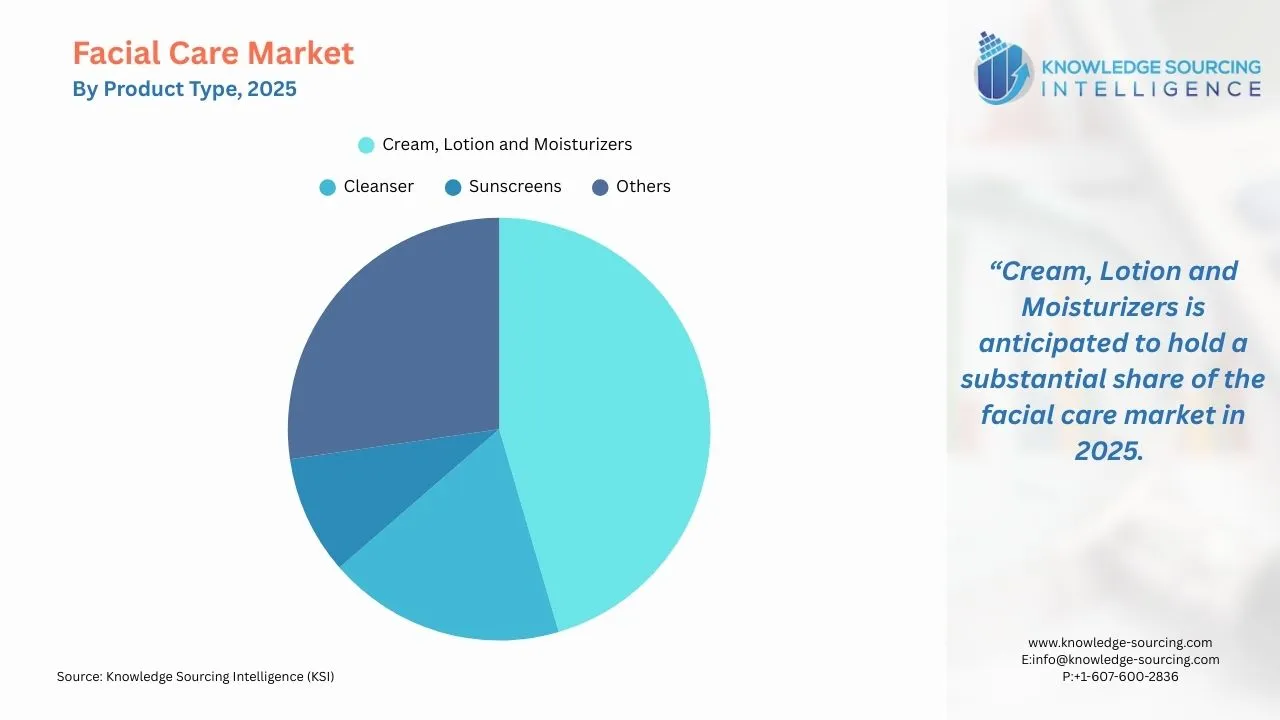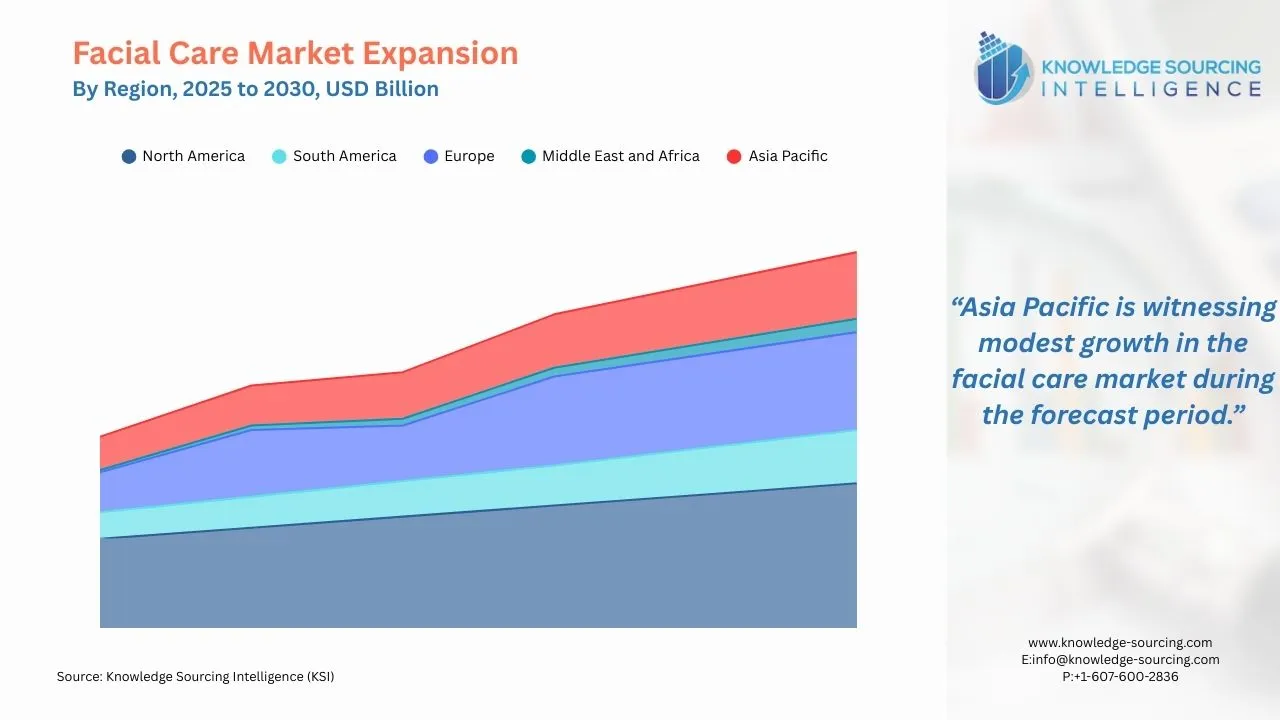Report Overview
Global Facial Care Market Highlights
Facial Care Market Size:
The Global Facial Care Market is expected to grow at a CAGR of 5.83%, reaching a market size of US$207.196 billion in 2030 from US$156.066 billion in 2025.
The facial care market consists of various products, from cleansers to active ingredients like retinol or niacinamide, helping maintain good skin health. It addresses multiple skin-related concerns like moisturization, cleaning, scrubbing, hydration, sun protection, aging, and other related concerns. The market for facial care includes products like cleansers, toners, moisturizers, exfoliators, facial masks, serums, face oil, acne-specific creams, and many other products to enhance the overall health of the face.

The demand for skincare products is rising as consumer awareness of the benefits of skincare products for the skin increases. At the same time, increasing pollution around cities is expanding the demand for facial care products for the protection and restoration of skin health. There are rising skin-related concerns, as the harmful effects of pollution are damaging the skin and leading to premature aging. Furthermore, the rising disposable income among consumers is fuelling the market expansion of facial care products as people are investing their income in premium products. Moreover, social media platforms like Instagram and YouTube are playing a significant role in shaping consumer preference for facial care products, leading to increased global facial care market growth.
The facial care market consists of products like creams, lotions and moisturizers, cleansers, exfoliators, serums, sunscreens, facemasks, and others (Facial oil, eye creams, toners, etc.), segmented mainly for females and males, where the female segment holds the largest market share. Facial care products are distributed primarily through online and physical retail stores like supermarkets, shops, etc. Some facial care companies are leading their distribution channel through pharmacies & drugstores. The market is fairly spread across Asia-Pacific, North America, South America, Europe, and the Middle East. However, North America has the largest market share, while Asia-Pacific is the fastest-growing facial care market in the forecast period.
Facial Care Market Growth Drivers:
- Rising trend for skin health and wellness is leading the market growth of global facial care
Over the last few decades, there has been an increasing trend in overall health and wellness. The skincare segment is growing exponentially, particularly for non-toxic, natural products that improve overall skin health. The awareness among consumers is increasing due to rising internet penetration. They are shifting their demand towards high-quality skin care products, enhancing their skin barrier repair and internal skin rejuvenation. This increase in the demand for skin care health is leading to market expansion for global facial care products.
As per annual reports of L’Oreal, the world’s largest cosmetics and beauty company, it had annual sales of 26.9 billion euros in 2018, and the annual sales in 2023 were 41.18 billion euros, suggesting an exponential increase in demand for skin care products worldwide.
- Social media influencers fuel the surge in demand in the facial care market
Social media like Instagram and YouTube significantly impact the skincare market’s growth. These platforms have become hubs for skincare education, leading to consumer awareness through influencers and celebrity endorsement. Brands are paying huge amounts to these social media influencers for promoting their brand, creating demand for skin care products. Social media is showcasing many skincare routines, such as glass skin and Korean skin, creating consumer preference and demand for these products. Thus, these platforms, especially through influencers who are ordinary individuals using the company’s brand awareness, are driving demand for the global facial care market.
For example, as per a recent study done by Harvard Business School, around 42% of consumers aged between 18 and 24 years old have confirmed that they rely on social media platforms for their skincare and makeup.
Facial Care Market Segmentation Analysis:
- Cream, lotion, and Moisturizer will continue to hold the largest market share in global facial care
The global facial care market is segmented into creams, lotions, and moisturizers; cleansers; exfoliators; serums; sunscreens; facemasks; and others (Facial oil, eye creams, toners, etc.). In the forecast period, creams, lotions, and moisturizers will continue to hold the largest share in the global face care market. This growth is owing to various factors, such as the fact that this is the most fundamental skin care product for hydration and maintaining skin health. The dry season also necessitates the demand for moisturizers for the skin. At the same time, moisturizers promote skin hydration, skin barrier protection, and, nowadays, SPF protection and anti-aging properties. Active ingredients like ceramides, hyaluronic acid, and glycolic acid are added to the moisturizer, promoting the demand for moisturizers.

Facial Care Market Geographical Outlook:
- Asia-Pacific will be leading the global facial care market growth in the forecast period.
The global market is segmented into Asia-Pacific, North America, South America, Europe, the Middle East and Africa. Asia-Pacific would be the fastest-growing global facial care market, though North America will continue to have the largest market share.
Asia-Pacific will be the fastest-growing market due to its huge consumer base and growing disposable income, with consumers, particularly in developing economies like India and China. At the same time, the working-class female population is also growing, increasing the demand for skin care products. Moreover, the growing e-commerce industry is making it easier for consumers to access beauty products. This, coupled with a huge young demographic in Asia-Pacific, is increasing the demand for facial care products significantly in the next decade.

Facial Care Market Restraints:
- High competition in the skincare market can limit market growth
Though the global facial care market will be experiencing promising growth in the next decade, the competition in the skincare market is fierce. There are tons of multinational and domestic companies offering varied skin care products. This intense competition can be a limiting factor for new entrants as these previous companies have established their brand value and leave little scope for new entrants to expand their market. At the same time, regulatory rules and regulations can hinder market growth.
Facial Care Market Key Developments:
- In August 2024, Justhuman launched its first skin care product,” Microshots Age Defying Peptide6 Treatment Cream,” based on neurocosmetics.
- In August 2024, Galderma signed an MOU with L’Oreal, providing the latter with a 10% stake in the form of a scientific partnership for research and development to advance its category in dermatology.
- In July 2024, Givaudan, a fragrance and beauty company, acquired b.kolomakeup & skincare. b.kolor is an Italian company specializing in the development of finished make-up and skincare products.
- In June 2024, Lubrizol Life Science – Beauty introduced a metaverse AI platform for PBC product manufacturers to understand the customers of Argireline Amplified peptides. This peptide is a multi-functional ingredient with intense anti-aging power that is helpful for dull and aging skin to transform into healthier and more glowing skin.
List of Top Facial Care Companies:
- L’Oreal
- Johnson & Johnson
- La Roche-Posay
- Unilever
- Proctor & Gamble
Facial Care Market Scope:
| Report Metric | Details |
|---|---|
| Study Period | 2021 to 2031 |
| Historical Data | 2021 to 2024 |
| Base Year | 2025 |
| Forecast Period | 2026 – 2031 |
| Report Metric | Details |
| Facial Care Market Size in 2025 | US$156.066 billion |
| Facial Care Market Size in 2030 | US$207.196 billion |
| Growth Rate | CAGR of 5.83% |
| Study Period | 2020 to 2030 |
| Historical Data | 2020 to 2023 |
| Base Year | 2024 |
| Forecast Period | 2025 – 2030 |
| Forecast Unit (Value) | USD Billion |
| Segmentation |
|
| Geographical Segmentation | North America, South America, Europe, Middle East and Africa, Asia Pacific |
| List of Major Companies in the Facial Care Market |
|
| Customization Scope | Free report customization with purchase |
Facial Care Market Segmentation:
- By Product Type
- Cream, Lotion and Moisturizers
- Cleanser
- Exfoliators
- Serums
- Sunscreens
- Facemask
- Others (Facial oil, eye creams. toners, etc.)
- By Gender
- Female
- Male
- By Distribution Channel
- Physical Retail Stores
- Online Retail
- Pharmacies and Drugstores
- By Geography
- North America
- United States
- Canada
- Mexico
- South America
- Brazil
- Argentina
- Others
- Europe
- UK
- Germany
- France
- Italy
- Others
- Middle East and Africa
- Saudi Arabia
- Israel
- Others
- Asia Pacific
- Japan
- China
- India
- South Korea
- Indonesia
- Thailand
- Others
- North America